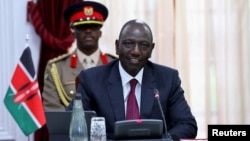Kenyan President William Ruto has welcomed a new resolution approved Monday by the U.N. Security Council authorizing a foreign security mission to intervene in Haiti. Ruto said he hopes the so-called Multinational Security Support Mission his country is leading will provide a different footprint in the history of international interventions in Haiti.
In a taped speech shared with the media Tuesday, Ruto said he hopes the mission will make a difference in the lives of Haitians.
“I welcome the resolution as an overdue and critical instrument to define the multinational mission,” he said. The mission is a fundamental intervention to provide the necessary conditions for Haiti to consolidate its development and governance.”
Ruto said it is essential that resources, as well as the operational scope available to the U.N. team, be appropriately reinforced.
This comes after the U.N. Security Council voted late Monday to authorize a foreign security mission to intervene in Haiti, a year after the Caribbean nation requested help to quell violent gangs.
Kenya offered to lead the operation in Haiti two months ago, saying it is willing to deploy one thousand of its police forces. On a recent visit to Kenya, U.S. Defense Secretary Lloyd Austin lauded the plan.
“We intend to work with the United States Congress to provide up to 100 million dollars in support and we urge others in the international community to follow Kenya’s great example," he said
Austin was in Nairobi with his Kenyan counterpart Aden Duale.
“Kenya has a very long history of global peace keeping,” Duale said “We were in Kosovo, we were in Namibia, we were everywhere and now we are in Somalia, we are in DRC, we have our officers in the Tigray monitoring and evaluation mechanism.”
But others, like Eugene Wamalwa, a former Kenyan defense secretary and the leader of the Democratic Action Party of Kenya, told VOA he had some concerns.
“We would expect the process to be transparent,” he said. “First of all, starting with our national assembly, our parliament should approve this. We expected also that this matter would be addressed at the AU [African Union] before being elevated to the UN. We first heard of it during UNGA in New York and we had the Americans praising us for offering our troops, we are not even aware we are sending our police officers in harm’s way. We have not discussed it. We have not agreed as a country.”
U.N. peacekeepers were deployed to Haiti in 2004 after a rebellion led to the ouster and exile of then-President Jean-Bertrand Aristide. Peacekeeping troops left in 2017 and were replaced by U.N. police, who left in 2019.
Amnesty International Kenya on Tuesday urged U.N. member states, human rights organizations and citizens to thoroughly examine the mission’s human rights and humanitarian implications before the deployment.
Meanwhile, Kenyans who spoke to VOA are divided on their police force possibly going to Haiti.
“We have a lot of problems, not only in our country but also in Africa,” said Victor Odhiambo. “We have problems in Sudan, in Somalia, we have security problems in several parts of Africa. If we wanted to solve any security problems, we could’ve started at home or at least regionally.”
Stanley Omuhinda, a pastor, struck a more positive note.
“It’ll help to cause them to have peace in that country,” he said. “Number 2, [it’ll] show that this country is a peaceful country, we can exercise peace in other countries, that is a very powerful thing this country has done. I support it with 100%.”
The mission has been initially approved for one year, with a review after nine months. It was not immediately clear when Kenya would deploy its police contingent to Haiti, but senior government officials have suggested it could come as soon as early next year.




